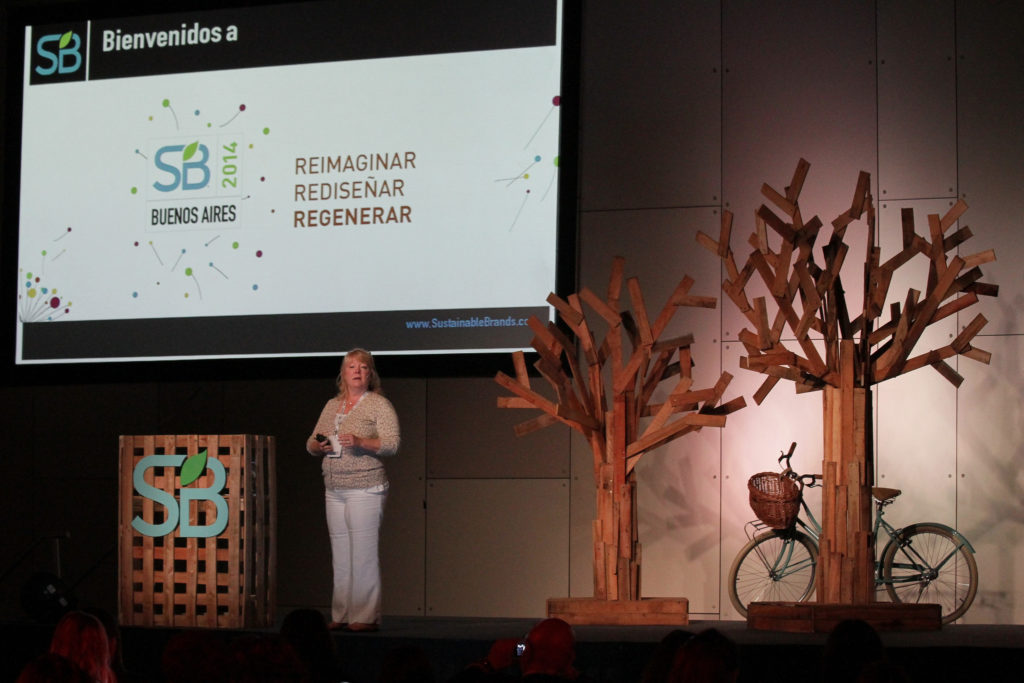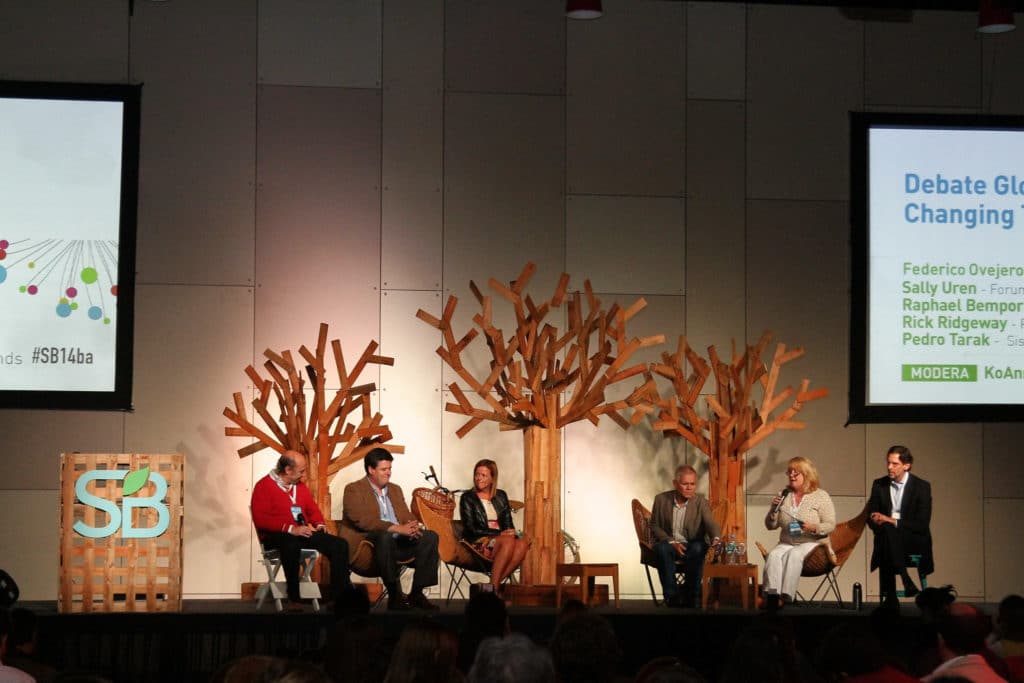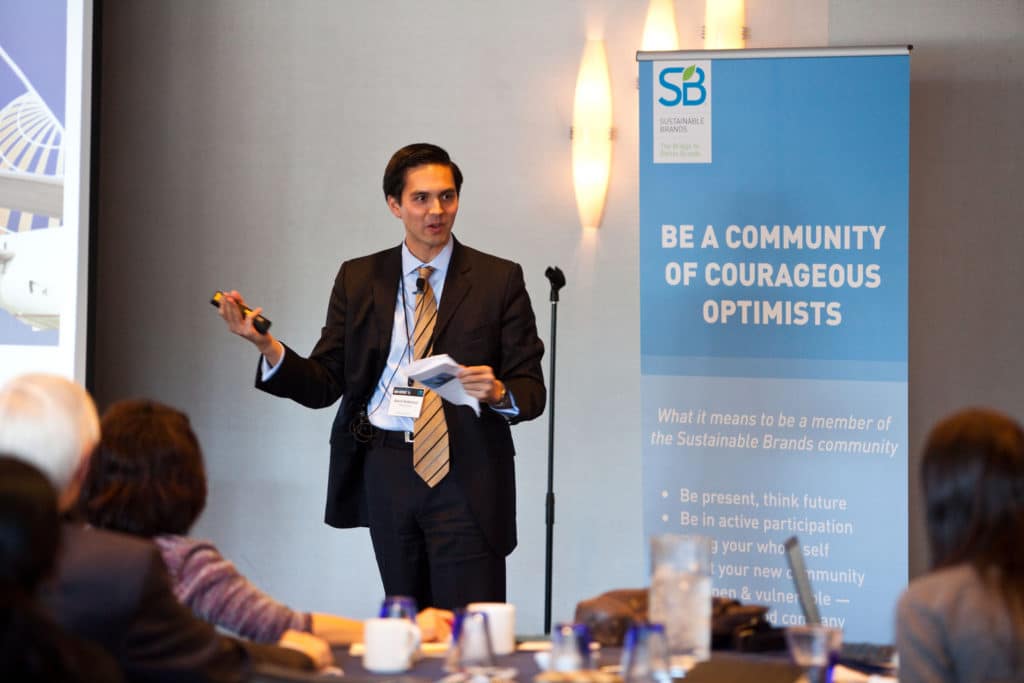
KoAnn presenting at Sustainable Brands, Buenos Aires, Argentina.
A Home for the Courageous Optimists
BY PAKSY PLACKIS-CHENG
KoAnn Skrzyniarz Brings Innovative Sustainability To the World
impactmania spoke with KoAnn Skrzyniarz, founder and CEO of Sustainable Brands. Over the years, Skrzyniarz brought more than 348,000 professionals together from the world’s largest companies, creating global education, and commerce communities focused on creating a better future.
From gatherings in San Diego, Copenhagen, Bangkok, Istanbul, Detroit, Madrid, Cape Town and Tokyo to Sustainable Brands (SB) global innovation platform, SB helps bring innovative sustainability and social innovative pathways to a wide variety of companies such as Unilever, Cisco, and Ford.
Skrzyniarz speaks about scalability, social entrepreneurs, and shares a few of her impact makers.
Early on, how did you recognize environmental and social responsibilities as important parts of business?
There’s been exploration and advocacy work going on concerning environmental needs much longer than I’ve been directly involved in impacting it. But in terms of this notion that environmental and social innovations represent the biggest business opportunity in the world, I do think, yes, I was one of the first to frame it that way.
This stems from years of working in the natural resources markets, realizing then that we are facing environmental shortages. A big driver in creating Sustainable Brands also came from having spent ten years in tech innovation, looking at the front end of innovation and technology it was easy to see how it is impacting the world.
It gave me a lens into shifting global economic systems, challenges and potential solutions appearing on the horizon.
Can you give me an example of what you saw that made you pause?
Thomas Friedman‘s book in the late ‘90s, Hot, Flat, and Crowded laid out the realities of the shifting global economic landscape. The Internet provided the general population an awareness of what was going on. This in combination created risks for businesses that didn’t get things together in addressing the issues and the growing awareness of them.
I met Bill McDonough, after the success of Cradle to Cradle (2002). His book helped me see that an entire paradigm shift in the way we operate in a global economy was needed. After I left my corporate job I was running a small consultancy. Purpose and profitability was something important to me, particularly after what I experienced in my corporate management life. I recognized how vital this was for our world at large.
This led me to one particular client and brand who had Anita Roddick [Founder of The Body Shop] and Paul Hawken [environmentalist and author] on their board. The two of them were very strong early voices in the impact of business and the opportunity for business and environmental social relations. I felt compelled to participate.
Having seen what you have seen, what would your advice be for starting social entrepreneurs?
BE BOLD. It took me a while to recognize and become comfortable with the fact that the unique perspectives we bring to the world happen to be our most important assets.
The best thing that we can do is figure out what those unique values, skills, and talents are; and seek to exercise as much of yourself as you can possibly can in every situation.
How did you get so bold, KoAnn?
I have no idea. [Laughs.] I was a kid who was picked on in school! I got to a place early in my youth where standing up for myself, feeling confident in my ability to perform was important to me. Engrained is all I can say.
I have been trying to figure out what engrained it so we can spread it around a bit more.
From my experience I am sure that hard times help shape personality.
What is your respond to investors who still say, “Social enterprises don’t scale.”
That’s an absolutely outmoded viewpoint. I’d say look at the case of the $15 burrito as Freya Williams says in her book Green Giants.
While many social enterprises don’t scale, it’s not a function of it not being a possibility; it’s either a function of the skills or the desires of the entrepreneur. Scale is not something that is a priority for everybody, and that’s okay. A healthy ecosystem needs small and large organisms working in harmony with each other.
What are some of the first steps a company can undertake to be more purposeful?
It’s all about self-reflection. It depends on where the company is in the stage of its history. It’s about digging into what your unique value proposition is in the world.
It is finding that intersection between what the world legitimately needs — not what you can push on them — and how you are equipped to add value.
A heavy-duty marketing mindset has taken our attention away from trying to understand value. Instead we looked at false values and pushed consumers to buy more stuff. That’s what led to the lack of trust in brands today. When brands are seen as more and more irrelevant to people’s life, that’s when business is at risk.
That’s why there is resurgence and a return to purpose.

Sustainable Brands with brand leaders and organizations that are shifting global societal aspirations toward a sustainable future.
This year alone (2016) you have held 13 Sustainable Brands events globally. How much commonality do you see across these different cities and continents when you’re having these discussions?
There is a lot commonality surprisingly — certainly in terms of the tenor of the community. We have been dubbed as the home for courageous optimists. That is reflective of who we see showing up at our events all over the world. They’re all smart, courageous, and super interested in collaboration and innovation. Hungry learners. Every culture has its own flavor and it’s own geographic issues but everybody in our community is starting to understand how they’re connected to a whole system. For that reason, the conversations are very similar.

Aaron Robinson, United. SB’s Boston event New Metrics, November 2016.
To the point of collaboration: for many of these social issues we need to reach across the aisle for solutions. Have you seen a project, program, service that has been tackled by the private-, nonprofit-, and public sectors successfully?
This week, we announced a collaboration in Detroit: an initiative between Boeing, General Motors, Herman Miller, and a local nonprofit called Michigan Urban Food.
They’re coming together to build what has been cast as the first Agrihood in the U.S. An Agrihood is an effort to redevelop a dying neighborhood by locating an urban farm as a way to attract people.
What in general do you think is needed for social impact?
It starts with awareness of the impact you have and can have. We individually and collectively have impact on the world. What holds back a lot of people is the feeling that one person can’t make a difference.
We sit back and assume somebody else is going to fix the problems or take advantage of the opportunity.
It is empowering for people to think how our problems can be the fuel for new business opportunities, asking how can I become a part of the solution, benefit myself, and also the world around me? This has been starting to happen more and more — that’s why I feel optimistic about the world ahead.
What has been a surprising thing you have learned in building Sustainable Brands?
I left my corporate job running a multinational business. I didn’t set out to start a business at all, when I saw this opportunity I tried to ignite someone else to do. It turned out that nobody else wanted to. It became up to me.
I’ve been quite humbled by the scale of our impact. From what I can tell, we’re just getting started and we’re starting to rapidly pick up speed.
We always ask our interviewees, who has left an imprint on your professional DNA. You’ve mentioned a few people, but is there someone that comes to mind who helped shape you as an entrepreneur?
Hazel Henderson, she must be 81 and she continues to have global impact. I’m inspired by her commitment and efficacy of her continued contributions. She’s been involved in the front end of economic innovation for some time. We are in contact regularly.
What’s next for you?
Expansion — we are adding teams and partners around the globe. We have plans for launching a digital learning platform.
Give me a few words that describe your journey so far.
Humbling and inspiring hard work and a heck of a lot of fun. It’s been absolutely amazing to have the chance to build the relationships that I’m having the chance to build. There are a lot of great people and that’s super inspiring. I feel very lucky.

